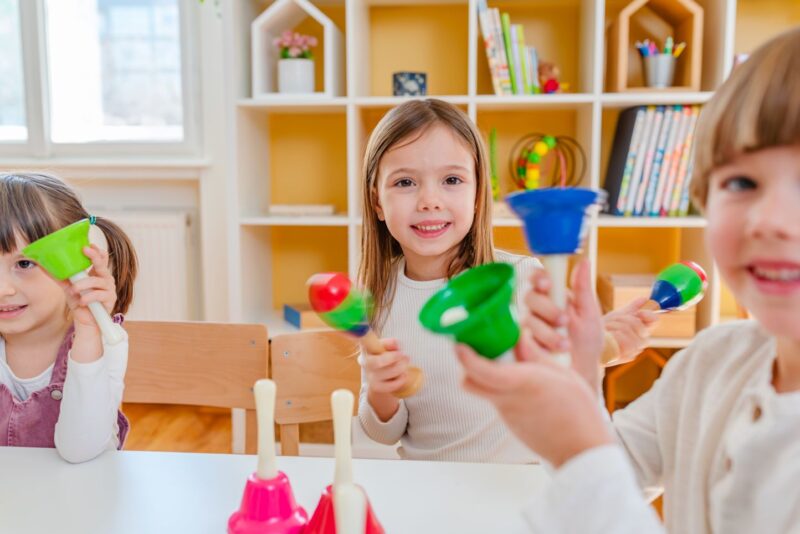The Impact of Music Therapy at Mandeville
October 15, 2024

By Rebecca Gleave, Music Therapy Assistant, EMT.
Mandeville School is a special education school in the Greenford community for children aged 2-11 with Severe Learning Difficulties, Autism and physical disabilities. Children at the school come from a variety of cultural and social backgrounds and have a diverse range of needs.
We have been working with Mandeville for over 25 years and are so proud of the work we have done together to provide a thriving Music Therapy service within the school. Our service has developed over recent years and we are now able to provide a 3-day Music Therapy service at Mandeville, meaning that more children than ever have access to support from our dedicated HCPC-registered therapists.
Last year, 17 children at Mandeville received Music Therapy through our service. Our Therapists helped the children with a range of challenges and needs including developing pre-verbal communication, social interaction and attentions skills; building positive relationships with others and working on peer relationships; managing sudden illness in the family, and changes in home and school environments; managing anxiety and emotions; and helping maintain skills due to degenerative conditions.
We are excited about the continued development of our service within Mandeville! We want to thank all the school staff, and give special thanks to Mundrika Bhanderi, Assistant Head Teacher, for supporting Music Therapy and advocating for it as a powerful clinical intervention for children with additional needs.
Below, Mundrika has kindly shared her perspective on how Music Therapy has helped children at Mandeville.
An Assistant Head Teacher’s perspective
Developing positive relationships and interactions
“Music Therapy has enabled pupils to develop a positive relationship and interactions with their therapy partner through exploring instruments, turn taking and sharing. The children can explore different instruments in the room, often choosing to play with something different each week including the ocean drum, the wind chimes and tambourine.
When the Therapist stops playing the piano, Child A will come over to her to communicate that he wants her to continue by placing her hands back on the keys.
Child B enjoys playing instruments using his feet. He likes the feel of different textures on the bottom of his feet. He will take his shoes and socks off at each session and will enjoy walking along the carpet or standing on the drum. In some sessions the Therapist has encouraged Child B to use his feet to tap on the drum. He has enjoyed this and communicated that he has wanted this to continue.”
Increasing vocalisations and gaining confidence within self
“To support Child C’s communication and develop his play skills, the Therapist has developed this into the stop/go game which she introduced last term. When the Therapist stops, she will say ‘ready, steady.’ and will wait for Child C to say ‘go’. Child C now anticipates this game during joint music-making.”
Developing stability in emotional and physical wellbeing
“Child D loves Disney songs and in particular Frozen. This has become a regular feature in Music Therapy sessions. During improvised sections in the song ‘Let It Go’, Child D is able to explore free vocal expression, exploring different melodic vocalisations and enabling him to express himself in different ways.”
Find Your Voice group
“The Find Your Voice group is run by one of our Music Therapists and our Speech and Language Therapist. It provides a safe and predictable environment for pupils to explore and develop their communication skills. This includes facial expressions, oral-motor skills, use of breath and generation of voice. The Find Your Voice sessions also create opportunities to follow instructions e.g. “can you collect all of the whistles?” These skills can then be applied to playing simple blowing instruments along to singing songs.
The group has enabled pupils to:
- Develop their observation and awareness of one another. The children have developed their ability to collaboratively sing and play together.
- Overtime, with consistency and repetition, learn songs by memory or by reading lyrics. As a result of this, the children have developed the ability to anticipate parts of the song and sing along.
- Explore singing. By the end of the group, one pupil was able to independently sing a full song without prompting.
- Engage in the activities and sit for the full 30-minute session with consistent staff to support the children and sensory regulatory strategies.
- Grow in confidence. Over the year there were increased instances of spontaneous voice production.”
